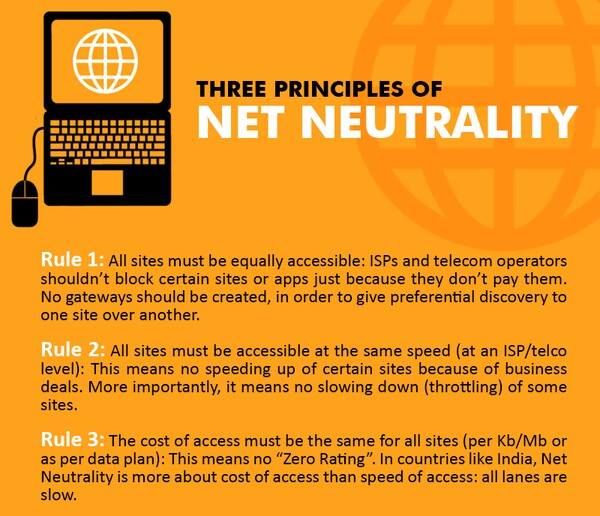If You are connected to the Internet, Social Media or any form of media, you must have heard about Net Neutrality and the protests that are going on.
While it feels like iSPiRT hadn’t officially made any announcements on the same, quite a few of us have been working behind the scenes to ensure that our voice is heard and that TRAI takes the next steps regarding the Internet in India.
A bit of backdrop:
On December 2014, Airtel quietly dropped a note that they will be rolling out a plan that will differentially price calls that are made on its network – both voice and video calls, using skype or viber.
After the backlash that started, Airtel rolled back on its rollout plan, however forced TRAI to give them a guideline on how this should be handled, because the masses had mentioned it breaks netneutrality.
A bit of context:
India, if it gets the policy on Net Neutrality would be the 7th country in the world to have a stance on net Neutrality. Most nations assume a stance of Net Neutrality (as has been the case in India so far). But the policy defines a clear line in the sand, as operators all over the globe have been itching to cross the line to find ways to increase their profit margins.
Are we against Operators making money?
We aren’t. We understand that businesses need to be sustainable. But it is also the perogative of the ecosystem to allow for innovation to happen. Zero rating and slicing the internet into pieces and selling them in packets wouldn’t be innovation, it goes quite the other direction on that matter.
While on first look it feels as if operators are making lesser money, with the advent of applications, the opposite is true. Operators have evolved from voice and sms providers, to data providers. They are no longer circuit switched networks, but packet switched networks – and the latter is far more effective and allows for innovation on the applications layer. Idea, Vodafone and Airtel which are the three big players who control close to 75% of the mobile subscriber base in India have doubled their data revenues year on year. In the last 2.5 years, Airtel has made close to 15,000 crores in profit. So the stance that applications are eroding the profit margins is not a fact.
Why is this important to the startup ecosystem?
Net Neutrality isnt a principle by itself, but also one that dictates a fair an open market when it comes to dealing with the internet which is a public property. The ability for anyone to be able to contribute has been the core fundamental on which the Internet is built – and the operators who want to be gatekeepers
with their influence could totally alter the way that goes about.
In case the debates around this topic have been too cumbersome to follow, this picture would help.

Zero Rating : Airtel and Internet.org
One of the key tenets that the telecom lobby is playing is using the analogy of Toll Free numbers to allow for bigger companies to subsidize the cost of access for certain applications in a network. The simple question we have been asking is, what about startups that might not have the money to pay operators to fight the defacto incumbent who would have paid the operator.
How can you pitch in?
Till the 24th of April, TRAI (Telecom and Regulatory Authority of India) is taking feedback on the 118 page consultation paper that they have put out. The Paper seems heavily influenced by the telecom operators who claim that OTT (Over-the-top) services need to be regulated.
You can send in your feedback to the 20 part question that they have raised, to let them know your thoughts.

